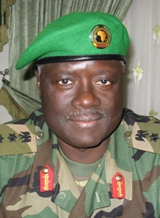Hybrid force commander concerned by Darfur newcomers
July 20, 2007 (EL-FASHER) — During a with Britain’s new international aid minister, the AU-Un force commander has expressed fears that IDPs who abandoned their villages and live currently in the camps may not be allowed to return to their villages after peace.

He said he noticed that some villages, abandoned due to the ongoing violence, are now being occupied by cross-boarder tribes. The original inhabitants, meanwhile, live in IDP camps. He said, “Reoccupation of Some abandoned villages by alien Communities may threaten IDP’s return rights and future stability in the region.”
London based The Independent last week said it had obtained an internal UN report showing that up to 30,000 Arabs have crossed the border in the past two months. Most arrived with all their belongings and large flocks. They were greeted by Sudanese Arabs who took them to empty villages cleared by government and janjaweed forces.
The talks between the hybrid force commander and the visiting British minister for International Development Cooperation on Friday July 19 were dominated by the future of the peacekeeping operation in Darfur.
The visit of Douglas Alexander to EL Fasher, less than a month since assuming office signals the level of priority Gordon Brown’s government assigns to the peace operation in Darfur.
During the meeting, General Agwai, expressed optimism that peace in Darfur is achievable, provided the necessary support needed to augment African Union troops is deployed at the soonest possible time.
However, he stressed, the importance of overcoming administrative and budgetary challenges facing AMIS troops on the ground, before the advent of UN support forces, to ensure the smooth implementation of the future UN Heavy Support Package and Hybrid operation.
The Secretary of State told General Agwai, who is expected to command the future UN-AU Hybrid Force, “We believe you are the best person for the job.” He added, “We are aware of the challenges the troops are facing and I am looking forward to your suggestions on how we could support your efforts.”
Prior to meeting with the AMIS Force Commander, Douglas Alexander and an accompanying delegation visited IDP camps in El Salam and Abou Shouk, following a courtesy visit to the Wali of North Darfur.
The UN is currently stepping up preparations for the deployment of the heavy support package, which is the second leg of the three-phase programme to support and enhance the under-resourced AU Mission in Darfur, while efforts are under way to establish the hybrid UN-African Union force.
A large troop contributors’ meeting was held earlier this month at the UN Headquarters to discuss the shape and form of the hybrid operation. Britain, France and Ghana had circulated a revised Security Council draft resolution authorizing a 26,000-strong African Union-U.N. peacekeeping force for Darfur for an initial period of 12 months.
General Agwai said that despite the challenges the new hybrid force – which will report to both the UN and the AU – may face, the two organizations are “committed to working together to effectively coordinate the operation for the benefit of the people of Darfur.”
(ST)
